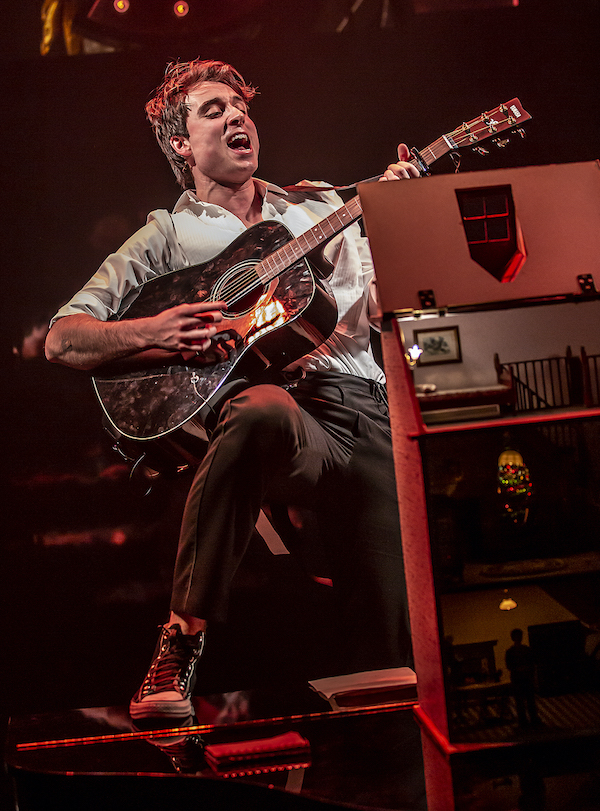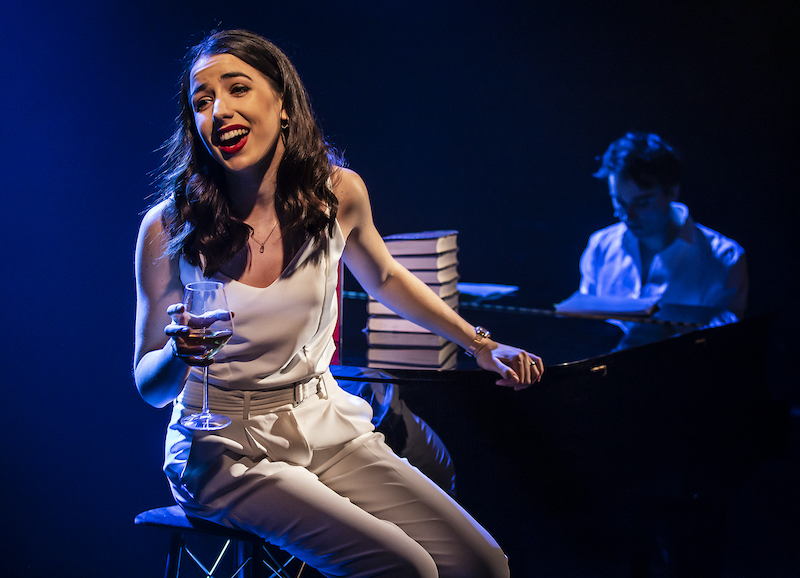There’s concept on top of concept in this revival of Jason Robert Brown’s beloved 2001 musical, which charts the ebb and flow of a relationship by juggling timelines: aspiring actress Cathy’s story is told in reverse chronological order, while aspiring writer Jamie’s moves forward. It’s an apt framing for a couple who are never on the same page, their dual ambitions and relative success wrenching them apart. Director Jonathan O’Boyle now adds another layer: this is an actor-musician production, with both performers playing the piano throughout, among other instruments.
There are crystalline moments in which this proves an absolutely genius idea, and it’s certainly a thrilling showcase for Molly Lynch and Oli Higginson. Brown’s characters are constantly moving between loving accompaniment and a kind of strained counterpoint anyhow, and this production literalises those shifts in musical terms. One character, in the rosier part of their relationship, will sing with earnest hope, while their partner undercuts them by thumping out ominous chords on the grand piano that sits centre stage; we hear, too, melodic echoes played by each at different times, always out of sync. At the show’s tenderly romantic midpoint, when the newlyweds are united for once, they nestle together on the piano stool in a bubble of tranquillity and harmony.
 The device isn’t perfectly used throughout. Occasionally, one performer plays while another sings without there being an obvious purpose – so much so that it threatens to disrupts this portrait of a gulf opening up between the pair, who move from opposites attract (the Jewish writer jubilantly falling for a ‘shiksa’) to simply repelling. And while the rockier and more lively numbers sound fantastic in MD George Dyer’s detailed orchestrations and Adam Fisher’s rich sound design, the actors war with the band in the more introspective songs, and inconsistent American accents also muddy Brown’s intricate lyrics. It would be helpful if the band levels were taken down slightly so that the performers’ playing is more evident; at one point, Higginson strums a guitar (pictured above right), but it has more visual than aural impact.
The device isn’t perfectly used throughout. Occasionally, one performer plays while another sings without there being an obvious purpose – so much so that it threatens to disrupts this portrait of a gulf opening up between the pair, who move from opposites attract (the Jewish writer jubilantly falling for a ‘shiksa’) to simply repelling. And while the rockier and more lively numbers sound fantastic in MD George Dyer’s detailed orchestrations and Adam Fisher’s rich sound design, the actors war with the band in the more introspective songs, and inconsistent American accents also muddy Brown’s intricate lyrics. It would be helpful if the band levels were taken down slightly so that the performers’ playing is more evident; at one point, Higginson strums a guitar (pictured above right), but it has more visual than aural impact.
Lynch’s performance is a little too mannered initially, but she soon excels as Cathy vents her fury at increasingly unavailable husband Jamie, the self-appointed “saviour of writing” since his novel catapulted him into the bigtime (via a John Updike review in the New Yorker, no less). Meanwhile, Cathy’s acting career has stalled – as illustrated in a furiously funny sequence that Lynch nails, demonstrating the morale-sapping futility of cattle-call auditions – and she winds up doing rep theatre in Ohio while Jamie’s career takes off back in New York.
In “A Summer in Ohio”, Cathy presents her experience as a funny skit, here accompanied by Lynch’s dazzlingly manic ukulele playing during a Skype call to Jamie. It’s a very effective way of showing how Cathy is trying to put on a brave face using her skills as a performer. Acting becomes lying – to herself, and to her partner. O’Boyle’s production is sensitively attuned to this pair as artists, each searching for their voice, and the addition of instruments helps stress that element of Brown’s semi-autobiographical chamber song cycle. They are always putting on a show.
Higginson’s is a hyperactive, puppyish Jamie – sometimes distractingly so, as when he does numerous laps of the piano like he’s training for a race. But he charts his character’s painful maturity well, building his swagger as an acclaimed storyteller (charming when he creates the Schmuel fable just for Cathy, cringe-worthy when he begins a novel reading with soft-voiced affectation), and the simultaneous agony as he realises that success in one area fuels conflict in another. Yet there’s a sincerity to his attempt; when, during the Schmuel story, he proclaims “I give you unlimited time!”, it really feels like a promise made to Cathy – albeit one he can never deliver. Both actors have excellent voices, Higginson adept at wistful balladry and especially the pop-rock roar, while Lynch gives us truly exquisite pure-toned vocals, including hints of a gorgeous high soprano. Both, too, are accomplished and expressive musicians; in a particularly boss move, Lynch (pictured above) picks out a piano intro with one hand while holding a glass of wine in the other – a level of nonchalance to which we can all aspire.
Both actors have excellent voices, Higginson adept at wistful balladry and especially the pop-rock roar, while Lynch gives us truly exquisite pure-toned vocals, including hints of a gorgeous high soprano. Both, too, are accomplished and expressive musicians; in a particularly boss move, Lynch (pictured above) picks out a piano intro with one hand while holding a glass of wine in the other – a level of nonchalance to which we can all aspire.
O’Boyle’s use of a central revolve is clever, giving us a changing perspective on the couple as they move through their opposing timelines (and opposing perspectives) and preventing the 90-minute piece from feeling static. In contrast, the use of very literal props begins to grate; when the performers are just left to communicate with us, in this very intimate space, they do so strongly. More effective is the illuminated ‘L5Y’ above the stage (set design by Lee Newby) – appropriate for two people who dream of seeing their name in lights – and its meaning adds a poignant inevitability to their marital struggles. Dyer’s excellent band are glimpsed behind it, capturing Brown’s eclectic score (mixing pop, jazz, folk, rock and even Klezmer) with just keyboard, violin, guitar and cello.
Like the finest works that jostle chronology, not just for trickery but in order to enrich the piece, Brown’s formal experimentation leads to a profoundly moving climax. At its best, O’Boyle’s exciting new take builds on that, clashing the couple’s romance against an artistry that we witness in the form of this actor-muso bravura skill. The yearning for that creative fulfilment becomes a palpable presence – and it challenges the audience, more than usual, to weigh that up against love. But even the most ambitious cannot fail to be moved by Cathy’s “I Can Do Better Than That”, sung as her relationship with Jamie is just taking off; she’s so blissfully sure of what she wants and that it’s “finally” falling into place. Of course, it transpires that this is just the beginning of the journey, not the happy end.
- The Last Five Years at Southwark Playhouse until 28 March
- Read more theatre reviews on theartsdesk















Add comment